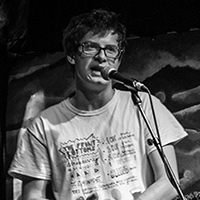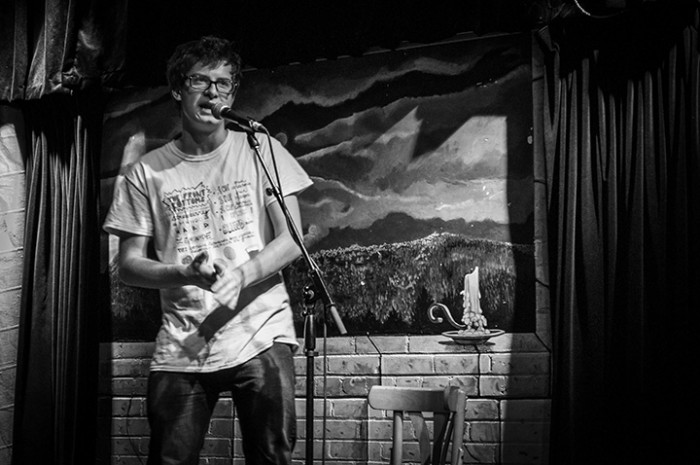After You
by Chris Vanjonack
When Jenny first approached me in the coffee shop, she was attracted to me primarily due to the eye patch strapped across my left eye that had been issued in the wake of a car accident. The accident left me scarred and averse to highways, pitched blood across my shirt and scratched an abrasion on my left cornea. It hurt like hell; the doctors couldn’t have prescribed enough painkillers. But the accident—which, by the way, killed the man that hit us and totaled my friend’s car—also left me emboldened, standing out like a beacon in a sea of nondescript, middle class, middle-income white boys, of which I am usually just another faceless member.
And so at Holly’s Coffee House that day—I think it was around noon, I think it was a Monday—Jenny stopped and sat at my table and asked, apropos of nothing, “So are you a punk now?” I’d seen her around before. She’d never seen me with the eye patch. Through the shearing pain in my left eye, the only response I could muster was, “Yes.” And that one word, one syllable, one second reply was how we became friends. Good friends. The kind of spontaneous friendship that threatened to eclipse all else in the shadow of its urgency. Even before it got physical we couldn’t get enough of each other—smoking weed in the other’s bedroom, going to all-ages matinee shows, and giving overly-dramatic readings of young adult novels at the local library to the chagrin of anxious librarians. We spent so much time sipping McFlurries and talking about who knows what at the McDonalds with the broken arches that soon it was hard to remember I had ever even known anybody else.
But of course I knew other people. Guys from around town. Girls from Denver. Before Jenny, I had been trying to get by with around ten friends, a tape recorder, a fake set of flowers and around a hundred or so in savings to get me through the trials and tribulations of laser-tag sessions, rewritten Blink-182 anthems, U-Haul trucks, movie nights, garden gnomes, weeklong strings of all night overnights, three ex-girlfriends, two unreturned security deposits and a book with kaleidoscope binding that took way too long to answer the question of what is good in life.
Looking back, I guess I shouldn’t have been so surprised when it happened. It was after the going away party for Jenny’s ambitious, intelligent, going-somewhere younger sister. A fight almost broke out next to Shelter D with some punk kids talking shit and dropping N-bombs, but Jenny just laughed because she has always had the foresight to know when something would make for a good story. She didn’t cry during the party. She cried afterwards when it was just us and the bed sheets. Because her mom was dead and her sister was leaving, and so it was only going to be her and her sad dad for a while, but she had me, and we felt positive, and so she decided it should happen. And I always knew it would happen, but it was in the same way that I have always known that I will die one day. It was just that it had already happened (repeatedly, excessively, riotously) to so many people in my life that I had started to worry that by the time it did, I’d be too old to get it up. And so when she led me up the stairs to her bedroom, sat me on her bed, told me she’d never be happy, Christ, and started crying when I presented her with a wrapped copy of this god-awful YA book we’d been making fun of –the plot of which concerned a love triangle between a werewolf and a vampire and a horribly disfigured Chernobyl survivor—I was just as surprised as anyone that she took me.
By now, by the way, I feel as though I know everyone (or at least everyone who will matter), but still I try not to cap the friends list on Facebook at X number of people, because I know that each of them can hardly wait to tell me about how they are going off to get married and have babies and live out the passive-aggressive American dream of growing resentful of each other and never forgetting that one shitty thing the other one said during a Jets game twenty years ago, or shaking the lingering feeling that they should just say, “Fuck it,” and run away to Europe where they might still be miserable but at least the people have class.
Of course, we Americans have culture: I got this burning recollection of a cardboard cutout of Homer Simpson carried around by two kids on the last day of classes. The kids had cherry bombs too, and matches and fireworks, real sketch, doused in kerosene. I dunno, I dunno. They’re emotional fireworks? Poorly disguised euphemisms for ejaculation? We’ll get it on. We’ll take it off. I’ll get her off—off to turn her towards a urinal while her chest opens up and a bag of confetti comes shooting out, clearly on something, fucked up like her father at that incredibly sketchy birthday party they threw for her recently deceased mother where he and Jenny and her sister all put on party hats and cried watching home movies, and tried to pretend what a fun day they would be having if only she were still alive.
But yeah, yes—American culture. Second semester sophomore year, I went camping, joined a band, got really into The Pixies and made a list of all the things that Salinger never said about Cloverfield. I wish I had known Jenny then so that we could have talked about all the things that people never said about all the things we ever loved, and we could have held hands together, the Human Centipede being very disappointed that we were not discovering our sexualities through creatively phrased GOOGLE image searches with the safe-search functionality turned off and our underpants wrapped around our ankles.
I pop pop-culture like Claritin in the springtime and Vicodin after a car wreck. Video killed the radio star, and the Kardashians killed the hipster, AV Club, cooler-than-thou commentariat, who decreed in a post on the internet that in a post-modern, post-consumerism, post-apocalyptic cultural landscape we might as well all go marry gold diggers—old-timey pan handler types who trudge knee-deep in the Colorado River and boast a similar materialist ethos to the sexy cliches who die first in horror movies. There are Nazis at the center of the Earth, according to that SYFY channel original special that starred an improvisational actress from the Groundlings who I might have fallen in love with and jerked it to endlessly had it not been for Jenny. Her wallet was found by the kind cashier at the movie theater, and I am returning the interabang that accompanied the epiphany that I was in love with her in order to express my deepest surprise that anybody would ever let me get so close to them.
For so long it’s just been about this new thing and that new thing, but lately it’s become obvious that the largest congregation of all the coolest shit was only ever there to make me think I’m not so lonely. I am surrounded on all sides by the pulsating beat of punk-rock music, the enthusiastic blasts of Edgar Wright direction, and a hyped-up feeling that I know all the cool books to claim I’ve read, each of them written by beatnik, weirdos who enjoyed anal fingering. But through the sound of that silence that surrounds me, as I got so close to Jenny that night, I was not thinking about the screech of bagpipes and accordions at old fashioned funerals—even though, as my legs extended in a fit of ecstasy, I knocked over the framed photograph of her mother that she keeps on her bedside table—but rather about that moment just beforehand when she put her hand on my cheek and intertwined her limbs with my ventricles, enough caffeine coursing through my veins to make me really believe all of that grand romantic love shit that I watched in high concept romantic comedies that I said I only screened to be ironic. Her body was against mine and her skin was cold, I was hard, she was crying, and this shit was formative, because in that moment she seemed intimate and I felt infinite because there are perks to reading all these shitty young adult books.
BIO
 Chris Vanjonack is an English teacher living in Fort Collins, Colorado, where he helps run Slamogadro, a monthly poetry slam that is fast approaching its second anniversary. His fiction has appeared previously in New Haven Review and Buffalo Almanack.
Chris Vanjonack is an English teacher living in Fort Collins, Colorado, where he helps run Slamogadro, a monthly poetry slam that is fast approaching its second anniversary. His fiction has appeared previously in New Haven Review and Buffalo Almanack.














